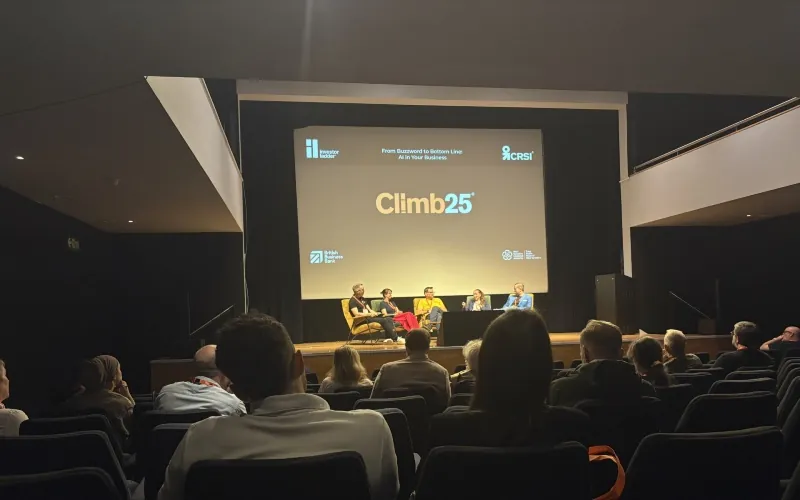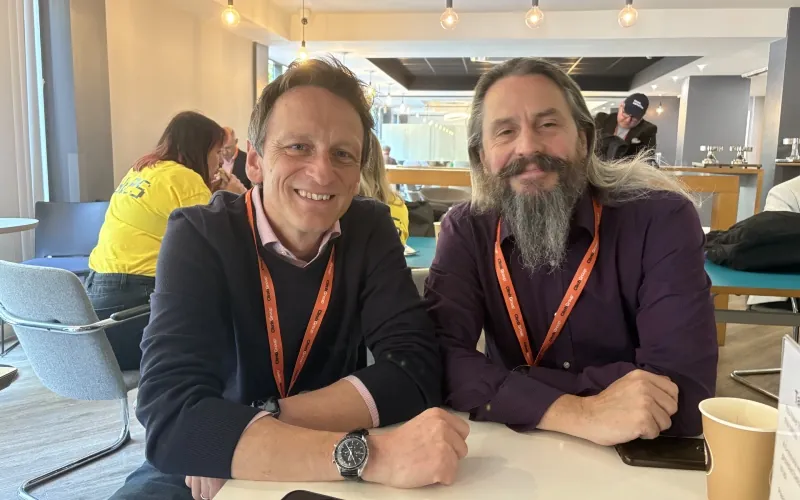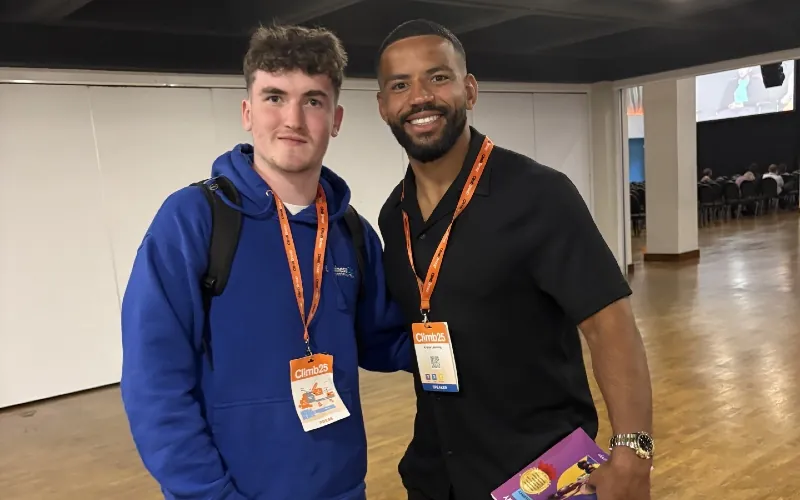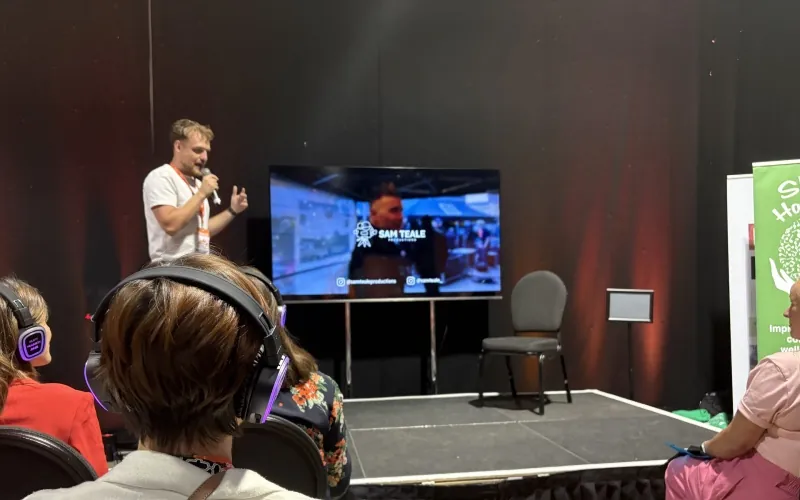It was fitting that, as I entered the Climb 25 complex on day two, Prince was blaring out of the speakers – because sporting royalty was about to feature on the Summit Stage.
Tessa Sanderson CBE, who became the first black woman to win gold for Great Britain at the Olympics with her victory in the javelin in 1984, would take to the main stage twice to discuss her unflappable mentality throughout her life.
It isn’t just a sport-centred day though, despite the mini football pitch now situated outside the registration and exhibition building.
At its core, Climb 25 is a festival of business, but despite topics like AI, investment and growth being heavily discussed, there is also room for those like mental health and social impact.
Although today seems slightly quieter than the first day, there’s still a real buzz around Leeds Dock as attendees congregate in the main room for the event’s reopening.
It’s anchored by BBC and Sky News regular Simon McCoy, who introduces a whole host of big names onto the stage.
These are Cllr Dan Cohen, Lord Mayor of Leeds; Darren Pirie, head of Accelerator at NatWest Group; Adam Kelly, co-head of fund investments for the British Business Bank; Sharon Jandu OBE, director of the Northern Powerhouse Ethnic Minority Business & Policy Forum; and Darren Jones MP, Chief Secretary to the Treasury.
Does AI have to take our jobs?
First up on my agenda is a session titled: ‘From Buzzword to Bottom Line: AI in Your Business’, where international keynote speaker Gary Crotaz quizzes a panel on how to best implement the two letters on everyone’s lips in the tech industry.
“I think a lot of this comes down to people and I think stakeholder buy-in is really important and is often missed,” says Zoe Webster, director of Authentic Innovation.
“What I mean by that is, with any kind of AI initiative, there are a whole bunch of stakeholders. Not just those who might be developing or buying it, but those who could be using it and those who are managing those who are using it.
“So there are a lot of people who need to conform to this. I think where AI works well is when everyone understands why it’s happening and why this change is potentially possible and positive, but also understands that, you can have aspects of a system where it’s not working so well, but can be captured and that can be learned from.
“Ultimately, understanding who the stakeholders are and getting them bought in is really important.”

‘From Buzzword to Bottom Line – AI in Your Business’, from the Elevate Stage
John Readman, founder and CEO of Leeds-based digital marketing firm ASK BOSCO, quips: “When I talk to other businesses and business leaders at other events, it’s like a lot of people are looking for this cost efficiency and how many people they can get rid of for this.
“We’ve all been automating data for years, right? The better set of questions for us is: how can we serve our customers better? How can we actually make more money? How can we retain our customers? How can we make our staff happy? Could we move to a four day week?
“There’s so many other things that AI could do for us and I think a lot of the leaders are just looking at it as a cost saving method rather than a business improvement.
“I think if we looked at it right in terms of how this can help us improve our business, which would help us improve our customers’ experience and our team’s experience, then maybe life could be better.”
The tech behind a sports media powerhouse
Planet Sport Group is the UK’s largest independent sports media business, engaging over 25 million fans every month through its network of brands, including Football365, TEAMtalk, PlanetF1.com, Tennis365 and Planet Rugby.
In its C-suite team are two industry veterans who spent over a decade each at Sky – CMO Andy Roberts and CTO Tim Lewis.

Andy Roberts and Tim Lewis, Planet Sport
“Media consumption is changing more and more rapidly each year,” says Lewis.
“Obviously the dawn of all the AI tools out there – be that search tools or curation tools, people’s viewing and reading habits are changing.
“What I’m used to using and what I’m comfortable doing is massively outmoded and out of date now, because I’m getting old. Whereas you look at my daughter like she consumes media in an entirely different way to me.
“That cycle of change is getting smaller and smaller and more and more rapid. So the trick for us is: can we predict where it’s going to be in a couple of years’ time, and try and get ahead of that curve to be ready for when the new hot thing lands?”
The company is based in the heart of a thriving sports and tech scene in Leeds.
Roberts says that the ecosystem needs to collaborate and make the most of this: Leeds has always had a great history of sports, tech and data businesses.
“I run a networking group called Digital Sport North to try and bring all those businesses and people around sports and technology together on a regular basis.
“Historically, Leeds has always been a great hub for sports content, which goes back decades. We’ve always known that the talent pool is here.”
Activating an elite mindset
“For me, elite mindset is all about practice, practice practice,” says Tessa Sanderson.
She’s speaking to a big audience from the Summit Stage about mentality and using her personal experiences to inspire others to apply some of these skills through their businesses.
The javelin gold medalist became the first to achieve the feat for Great Britain in a throwing event back in 1984 and competed in every edition of the Games between 1976-1996.
She continues: “You have to practise to make sure that your brain and your body knows that when you’re in that pressured situation, it’s already there. You know all you have to do is make sure that your body’s in position to go and do what you have to do.
“To me. It’s about planning, putting the big thing in place. Making sure that the mental strength that you have is very strong. If it’s not, then a lot of things that come in place of that are psychological warfare, because you do get that in whatever you are doing.
“You just have to activate that mindset and know how to activate it.”
Tessa is joined on stage by EXCELR8 Motorsport team owner Justina Williams, United Autosports commercial director Tim Vaesen, Extreme H’s chief legal officer Anaick Summers and journalist Tanya Arnold.
Towards the end of the session, Tanya spots rugby league star Kruise Leeming in the crowd, who joins the panel and shares his views.
As a massive rugby league fan and former player – albeit at nowhere near the level of Kruise – I approach him like a nervous fan boy for a picture.

Kruise Leeming at Climb 25
He expresses very powerful views on mindset and team cohesion, saying: “I work best when I’m empowered by others, when I’m feeling loved by who I’m working for. We talk about father figures – I think it plays a big part if you want high performance.
“It goes deeper than just blueprints or coding. It goes into what you are willing to do when somebody else next to you makes an error.
“You need to love your team like a family and not want to let them down. We don’t play in Grand Finals and top games and systematically, we’re perfect. That never happens.
“This is about who makes the errors, but then is willing to make up for that error. They’re the teams that win.
“Then you wonder, has it got all to do with systems at all? Is it not about just going out there with a love for each other and a passion and knowing that you’re never going to let each other down?”
A 22-year-old visionary
One of the smallest, but most powerful talks I attend is with 22-year-old entrepreneur and filmmaker, Sam Teale.
He has built Sam Teale Productions from the ground up after wanting to be a YouTuber as a teenager.

Sam Teale speaks to a fully-headphoned crowd at Climb 25
Now, having worked with the likes of Gary Barlow, the late Rob Burrow and produced content at Premier League stadiums, the filmmaker has won himself a whole host of awards.
He tells a heartfelt story – from being teased for wanting to produce online content to losing his best friend to a rare form of brain illness.
“In such little time, the person who was working with me had left and my best friend had passed away,” he explains.
“I had a choice: do I want to just give it up now or do I keep going to make her proud?”
And he is doing exactly that. An emotional Christmas ad reached 40m views and he continues to inspire the younger generation, proving that ‘Gen Z is not lazy’.
It’s tough to not find him charismatic and entertaining – he managed to really capture the attention of a crowd all wearing silent headphones in order to listen to his story better.
After listening to Sam’s tale, I leave Climb 25 feeling motivated.
The event was not only a huge boost for the local area, but a game-changer for hundreds of people and businesses who made new connections.
With Web Summit on the horizon, I exit this, albeit smaller scale festival, with high hopes for Lisbon and a real sense of excitement for November.
Look out for more exclusive BusinessCloud content covering Climb 25 in the coming days and weeks!
